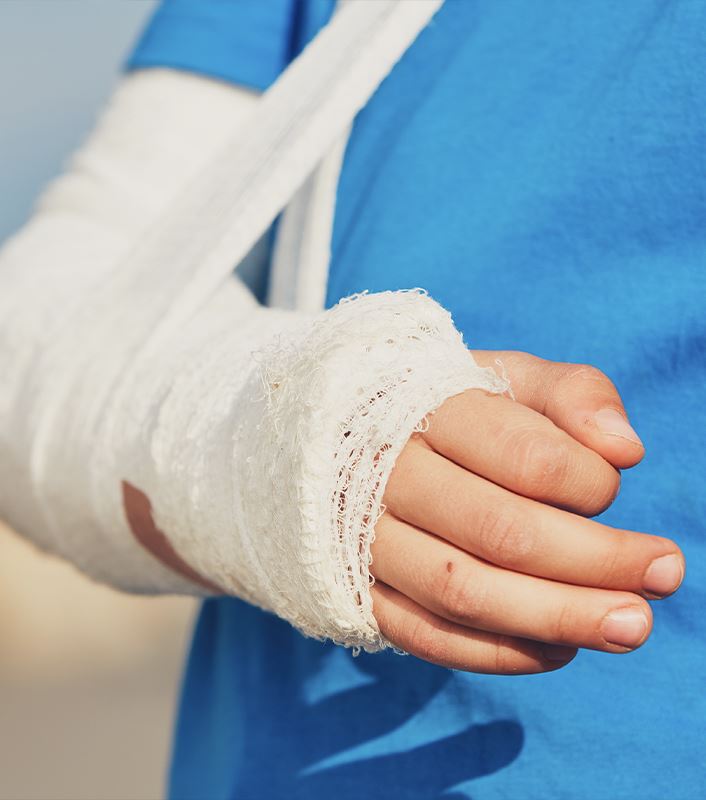Types of Premises Liability Cases We Handle in Maine
Premises liability laws can apply in a broad range of scenarios, many of which we are well equipped to handle. If you are still struggling to wrap your head around what premises liability is and when you may be entitled to compensation for injuries, keep in mind that you have a reasonable expectation of safety when entering someone else’s property. You could have a case if you suffer injuries due to an apparent unsafe condition the property owner failed to resolve or warn you about.
Common types of premises liability cases that Foster Law is prepared to handle include:
- Slips and falls. Slip and fall accidents can occur due to various types of property defects. Common culprits include wet or oily surfaces, weather hazards such as ice or snow, loose rugs or mats, and cluttered floors. Other contributing factors may include poor lighting that obscures visibility, uneven walking surfaces, or a lack of handrails on staircases. The injuries resulting from these accidents can be more serious than you might initially assume. While some victims may only suffer bruises, sprains, or superficial cuts, more severe incidents can lead to fractures, dislocated joints, traumatic brain injuries, and spinal cord injuries.
- Inadequate maintenance. Inadequate maintenance of a property can lead to a variety of hazardous conditions that may result in accidents. For example, neglecting the upkeep of staircases can cause preventable injuries. Missing handrails or poorly lit stairs can cause missteps and falls, potentially resulting in serious injuries like broken bones or traumatic brain injuries. Similarly, failure to fix protruding nails or sharp edges can lead to cuts or puncture wounds. Insufficient maintenance of outdoor areas of a property can also be hazardous. Failing to trim overgrown vegetation can obstruct walkways and cause tripping, for instance, while neglecting to clear ice or snow can result in slip and fall accidents, potentially leading to hip fractures or head injuries.
- Inadequate lighting. Dimly lit staircases, hallways, or parking lots can conceal tripping hazards such as uneven surfaces, obstacles, or changes in levels. Visitors might trip and fall, leading to injuries ranging from minor bruises and sprains to severe fractures or head injuries. Poor lighting can also make it more challenging to identify wet or slippery surfaces, increasing the likelihood of slip and fall accidents. Besides physical injuries, inadequate lighting can also contribute to crimes such as assault or robbery, as potential offenders may exploit the cover of darkness.
- Inadequate security. Under premises liability law, if a person is injured due to a criminal act that could have been prevented by adequate security measures, the property owner or operator might be held liable. Establishing what is considered “adequate” can depend on many factors, including the nature of the property, the foreseeable risk of harm, and the standard security measures prevalent in similar premises. For example, if a poorly lit parking lot leads to a robbery and subsequent physical assault, the victim may have a premises liability claim, especially if there is a known history of violent crime in the area. In another scenario, if a hotel guest is injured because the hotel failed to fix a broken door lock, this could constitute inadequate security. These cases are not as straightforward as some other premises liability cases and tend to require careful investigation. If you think you may have an inadequate security claim, our Portland premises liability lawyer is happy to assess the circumstances and advise whether you have a strong case.
- Elevator and escalator accidents. Elevators and escalators are complex machines that require regular maintenance and inspections to ensure their safe operation. Failure to properly maintain these systems can result in malfunctions such as sudden stops, abrupt starts, or doors closing prematurely. For example, if an elevator's braking system is not regularly checked and fails, it could cause the elevator to drop rapidly, leading to injuries such as fractures, sprains, or in severe cases, traumatic brain injuries. Similarly, escalators can pose hazards if their moving parts, such as the steps or handrails, are not properly maintained. A person might trip or get a limb caught, leading to cuts, bruises, or more serious injuries.
- Swimming pool accidents. If a swimming pool accident occurs due to the property owner's negligence, such as failure to maintain the pool structure or surrounding area, the property owner can be held responsible. For instance, if the pool deck is slippery and no warning signs are posted, the owner can be liable for any slip and fall injuries. Additionally, Maine enforces attractive nuisance rules, which means a property owner can be held liable for injuries to a child trespasser caused by an artificial condition on the property if it is likely to attract children who are unable to appreciate the risk. Swimming pools typically fall under this category. Property owners are required to take precautions, such as installing fences or pool covers, to prevent children from accessing a pool unsupervised. Maine also has specific regulations regarding pool enclosures and safety barriers for public swimming pools. If an accident occurs because these regulations are not adhered to, the property owner can be held liable.
- Dog bites. The owner or keeper of a dog is liable for damages if their pet injures a person who is not trespassing, tormenting, or abusing the dog. This statute follows the concept of "strict liability,” meaning that the owner can be held responsible regardless of whether they were aware of the dog's propensity to bite or not. Note that if the person injured is under the age of seven, it's presumed that they were not teasing or tormenting the dog unless the defendant can prove otherwise.
- Fires. Property owners and operators must implement adequate fire safety measures. Failure to install or maintain fire alarms and fire extinguishers can lead to liability. If a building's fire alarm system is not functional and a fire breaks out, leading to injuries due to delayed evacuation, the property owner could be held responsible.
- Exposure to toxic fumes or chemicals. In Maine, property owners can be held liable for exposure to toxic substances on their premises if they knew or should have known about the presence of these substances but failed to take reasonable steps to rectify the situation. This could involve hazardous materials like lead, asbestos, mold, or certain types of dangerous chemicals. For instance, if a property owner is aware that their building contains asbestos but fails to remove it or warn occupants, they could be held liable for any resulting health issues.
Premises Liability Cases in Bars and Clubs: A Guide for Injured Tourists
Bars and clubs are popular destinations for tourists seeking entertainment and nightlife. However, these venues can also present various risks that may lead to injury. Understanding your rights and what steps to take if you’re injured is crucial.
Common Scenarios Leading to Injuries
- Slip and Falls: Spilled drinks, wet floors, or uneven surfaces can easily cause slip and fall accidents. In crowded environments, these hazards might go unnoticed, leading to serious injuries.
- Inadequate Security: Bars and clubs are responsible for ensuring a safe environment. Inadequate security measures, such as insufficient bouncer presence or poorly managed entry points, can lead to incidents of violence or theft.
- Overcrowding: Exceeding capacity limits can result in dangerous conditions, such as trampling or difficulty exiting in an emergency.
Legal Responsibilities of Bar and Club Owners
Owners and operators of bars and clubs have a legal duty to maintain a safe environment for patrons. This includes:
- Regular Inspections: Conducting routine checks to identify and fix potential hazards.
- Adequate Training: Ensuring staff are trained in safety protocols and emergency procedures.
- Security Measures: Implementing sufficient security personnel and surveillance to prevent violence and manage crowds effectively.
Failure to meet these obligations can result in premises liability, making them legally accountable for injuries sustained on their property.
Seeking Compensation as a Tourist
If you're injured in a bar or club, you may be entitled to compensation for medical expenses, lost wages, and pain and suffering.
Here’s what to do:
- Document the Incident: Take photos of the scene, including any hazards, injuries, and the surrounding area. Collect contact information from witnesses.
- Report the Injury: Notify the bar or club management immediately and request a written incident report.
- Seek Medical Attention: Even if injuries seem minor, visiting a doctor promptly is crucial for your health and to support your claim.
- Consult a Lawyer: Contacting a premises liability attorney experienced in handling cases for tourists can provide guidance on the legal process and potential outcomes.
Tips for Tourists
- Stay Aware: Pay attention to your surroundings, especially in crowded or dimly lit venues.
- Know Your Rights: Familiarize yourself with local laws regarding premises liability and personal injury.
- Act Quickly: Time limits, known as statutes of limitations, may affect your ability to file a claim. Acting promptly is essential.
By understanding these elements, injured tourists can better navigate the complexities of premises liability cases related to bars and clubs, ensuring they receive fair treatment and compensation for their injuries.
Common Injuries That May Be Caused By A Property Owner’s Negligence
Premises liability encompasses a variety of incidents that happen on another's property due to the negligence of the owner or failure to maintain a secure environment. A range of injuries can stem from such liability, including, but not limited to, fractures and broken bones, often resulting from slips, trips, and falls. Head injuries, including traumatic brain injuries (TBIs), might arise from objects falling or severe falls. In more grave scenarios, such as malfunctions with elevators or escalators or collapses of stairs, spinal cord injuries may occur. Additionally, cuts and lacerations can result from various hazards like broken glass or unattended sharp edges that haven't been adequately maintained or marked.
Additionally, dog bites and animal attacks represent another significant category of premises liability injuries, often due to the property owner's failure to control their pets. Burns and smoke inhalation injuries might result from fires, while injuries from exposure to toxic substances could also fall under premises liability if the substances were not properly handled or disclosed. Drowning or near-drowning incidents in swimming pools due to inadequate safety measures or signage are also common.
Each type of injury can vary greatly in severity, highlighting the importance of property owners maintaining their premises to prevent such accidents and injuries.
Speak with an experienced premises liability lawyer in Portland, Maine at CFoster Law, PLLC. Complete our online form or call (207) 305-3854.


